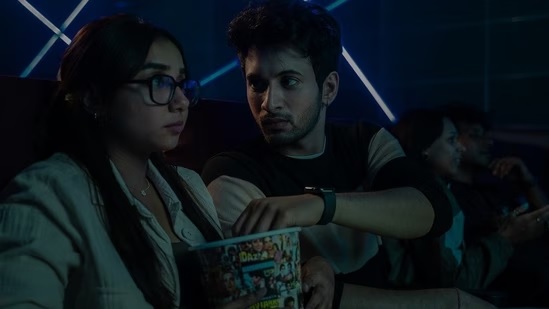Tech has always been integral to this coming-of-age series, and it feels only fitting that the 3.0 edition embraces the digital age. The new season introduces elements like artificial intelligence, the metaverse (termed ‘Betterverse’), and prominent tech institutions, shifting the action from the initial stages in Jaipur to the ambitious developments in Hyderabad. Dimple (Prajakta Koli) and Rishi (Rohit Saraf) are now navigating a long-distance relationship, adding complexity to their already tenuous connection. Is the Betterverse a progression or a regression for them?
As Rishi and other key characters transition to Nandini Nahata’s (Dipannita Sharma) institute, they innovate to create the Betterverse, an alternate virtual reality. The geographical distance from Ambala to Hyderabad transforms Dimple’s interactions with Rishi into a digital affair. They may meet in an idyllic retreat and dream home, yet a persistent yearning to experience each other physically lingers. Rishi encourages Dimple to join him in Hyderabad, but she grapples with the emotional fallout from Nandini’s rejection in the previous season.
The season’s thematic core revolves around the tension between reality and the virtual world. A long-distance couple questions the authenticity of their first physical encounter, pondering why it feels less fulfilling than their virtual escapades. One character attempts to resurrect their deceased father through an AI chatbot to process grief, while Anmol (Taaruk Raina) struggles with his sense of accomplishment even as he scores a goal in the Betterverse.
A compelling subplot arises with the introduction of Rith (Lauren Robinson), a queer hacker seeking access to the Betterverse to visualize themselves as a man rather than the woman society expects them to be. Their desperation feels authentic, thanks to Gazal Dhaliwal, the head writer known for her nuanced queer narratives in projects like Ek Ladki Ko Dekha Toh Aisa Laga.
The entire writers’ room for Mismatched—including Gazal, Aarsh Vora, Sunayana Kumari, Nandini Gupta, and Akash Jhunjhunwala—brings a rich diversity to the show. In Season 2, they broke away from traditional coming-of-age tropes to tackle challenging themes, and in Season 3, they elevate this approach further by incorporating relevant issues and well-developed supporting characters.
